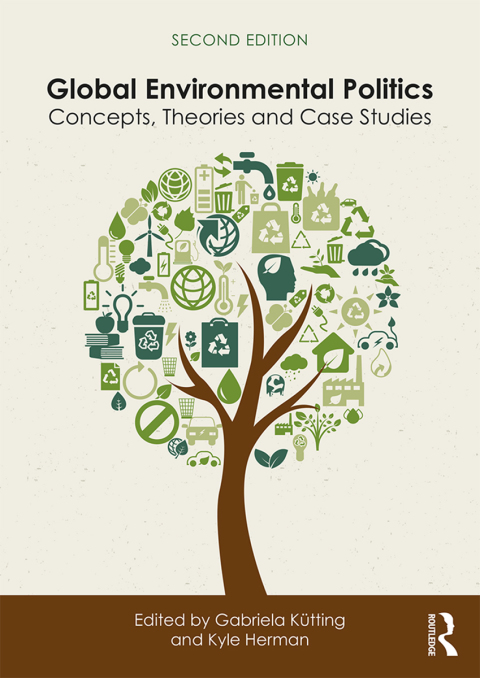Description
Efnisyfirlit
- Cover
- Half-title Page
- Title Page
- Copyright
- Contents
- Figures
- Tables
- Introduction
- References
- I Concepts and theories
- 1 International relations theory and the environment
- Classical IR theory
- The study of inter-state cooperation and regimes
- The critique of regime analysis
- Global governance
- Radical ecopolitics
- The return to security
- Conclusion
- Notes
- Bibliography
- 2 Transnational actors in global environmental politics
- Introduction
- Locating transnational actors in international relations
- From international regimes to global governance
- The space of global civil society
- Transnational actors in global environmental politics
- Transnational environmental movements and NGOs
- TNCs and business advocacy groups
- The greening of business or greenwash?
- The privatization of global environmental governance
- Conclusions
- Note
- Recommended reading
- References
- 3 Global political economy and development
- Introduction
- Theoretical and conceptual perspectives
- Environmental economics
- International political economy and development studies
- Global environmental governance and earth system governance
- Political ecology
- Major themes
- Is sustainable development possible?
- Limits to growth
- Kuznets-Curve
- Weak and strong sustainability
- Green growth vs. degrowth
- Neo-extractivism and Buen Vivir
- Who are the relevant actors?
- Conclusions and outlook
- Recommended reading
- Websites
- References
- 4 Environmental security
- Traditional security thinking
- The emergence of environmental security
- Environmental conflict and its critics
- Deepening environmental security
- Security as a social construct
- Climate security and the British government
- Conclusion
- Notes
- Recommended reading
- Online resources
- References
- 5 Sustainable consumption
- Introduction
- What is consumption and why study it?
- Concepts of sustainable consumption
- Global sustainable consumption governance
- Actors in global sustainable consumption governance
- United Nations Environment Programme (UNEP)
- OECD
- The European Union
- National governments
- Civil society
- Business
- The current state of affairs
- Barriers to change
- Sources of hope: what is the purpose of consumption?
- Policy implications
- Other research developments
- Conclusion
- Notes
- Recommended reading
- References
- 6 International environmental and ecological justice
- Historical overview of international environmental justice
- The literature on international environmental justice
- Status quo environmental justice
- Reformist environmental justice
- Transformational environmental justice
- Ecological justice
- Conclusion
- Recommended reading
- References
- II Case studies
- 7 Climate change
- Climate change science: environment and politics
- Environmental pollution and its consequences
- Politicization of climate science
- International cooperation: negotiations, agreements and policies
- The framework: the climate change convention
- Top-down: negotiating the Kyoto Protocol
- Bottom-up: the Paris Agreement
- Global politics of climate change: selected key themes
- Consumption
- Transnational actors
- Environmental security and justice
- Conclusion
- Note
- Additional reading
- Useful websites
- References
- 8 As China goes, so goes the planet
- Air and water: international environmental impacts
- China on the world stage: environmental leadership
- The resources quest: biodiversity
- The resources quest: minerals and other raw materials
- Development finance: green governance?
- Shifting strategies and tactics of Chinese ENGOs in uncertain times
- Conclusion
- Internet resources
- Further reading
- References
- 9 The role of technology in the global environment
- Situating technology in sustainable development
- Acid rain to climate change: evolution in science and technology
- Building long-term sustainable policies for climate change technology
- Technology for environment: a double-edged sword?
- The ambiguity in technology for environment
- Difficulty in developing clean technologies
- The role of policies for sustainable technology
- Static views, static results
- Global institutions and technology development for the environment
- Policy-induced environmental technologies
- North vs. South environmental technology development
- Domestic to international and vice versa
- Global renewable energy development is happening
- Conclusion
- Further reading
- Bibliography
- 10 The politics of energy and the environment
- Dealing with a triple challenge: geopolitical dimension
- Environmental dimension
- Energy poverty dimension
- Reliance on fossil fuels and the late emergence of the energy–climate nexus
- Reading the evolution of energy politics through security lenses
- Global energy governance: actors, organizations and their evolution
- Conclusions
- Notes
- Recommended reading
- Websites
- References
- 11 Endangered species, biodiversity and the politics of conservation
- From species extinction to biodiversity loss and the emergence of a new policy field
- The rise in interest in “biodiversity” as a scientific object and a global resource
- Data and evidence on species extinction
- Biodiversity conservation and economic development
- Defining “biodiversity”
- Global biodiversity politics and the politics of conservation
- The seven biodiversity-related conventions
- Other actors and overlapping issues
- The case of the CBD
- The politics of conservation in the 21st century: patterns and trends
- From the global biodiversity assessment to the “IPCC for biodiversity”
- Between ecosystem services and Mother Earth: diverse knowledge forms
- Biodiversity big data and the emergence of “essential biodiversity variables”
- Conclusion
- Notes
- Recommended reading
- Internet resources
- References
- 12 The global politics of food system sustainability
- Introduction
- A brief history of the evolution of contemporary food systems
- Twenty-first century approaches to achieving food system sustainability
- Critical issues in building sustainable agrifood systems
- Climate change and food security: agroecology vs. climate-smart agriculture
- Seeds: GMOs and the movement for seed sovereignty
- Looking to the future
- Notes
- Further reading
- Recommended websites
- References
- 13 Forest politics, neoliberalism and the limits of international environmental policy
- Introduction
- Forests as public goods
- An unconventional approach to international forest politics
- Neoliberalism and the fragmentation of international forest policy
- Forest certification and labelling
- International measures to curb illegal logging
- Knowledge patenting and benefit sharing
- Valuing the carbon sink function of forests
- Conclusion
- References
- Conclusion
- Index






Reviews
There are no reviews yet.